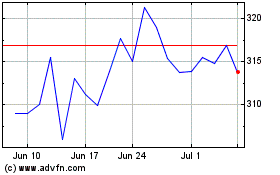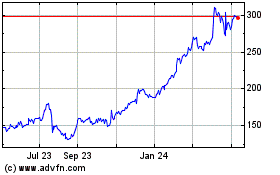Deal comes as company reports user growth that was better than
expected
By Anne Steele
This article is being republished as part of our daily
reproduction of WSJ.com articles that also appeared in the U.S.
print edition of The Wall Street Journal (February 6, 2020).
Spotify Technology SA has agreed to buy sports and pop-culture
outlet the Ringer, the company said Wednesday, as it posted
better-than-expected growth in users and said its investment in
podcasts is helping convert people who use its free tier into
paying subscribers.
The Ringer, founded by former ESPN commentator Bill Simmons in
2016, has more than 30 podcasts, and furthers Spotify's move beyond
music into broader audio and digital media. Terms of the
transaction weren't disclosed Wednesday. The Wall Street Journal
previously reported on the takeover talks last month.
Spotify Chief Executive Daniel Ek said as consumers' listening
habits move from radio to online, sports will be a key part of
Spotify's podcast expansion efforts.
"We look at this as we just bought the next ESPN," he said
during an interview after the deal was announced.
Spotify spent much of last year building out its podcasting
business, shelling out $400 million for three podcast companies and
striking more than two dozen deals for exclusive or original
content.
The company said people who listen to both music and podcasts
are more likely to become paying subscribers than people who listen
only to music, thanks to higher engagement and retention among
those listeners. More than 16% of Spotify users now listen to
podcasts, the company said, and consumption hours nearly tripled in
the fourth quarter from a year earlier.
Mr. Ek said 2020 would be another banner year for more
deals.
"We're really encouraged by the numbers," he said. "It doesn't
make sense for us not to invest very aggressively."
At the end of the fourth quarter, Spotify had 271 million
monthly active users, topping the company's expectations. The
company had 124 million paying subscribers, its most lucrative type
of customer, which was at the high end of its guidance.
Average revenue per user for the paid-subscription business fell
5%, or 6% excluding foreign-exchange-rate effects, to EUR4.65
($5.14), mostly due to an extended free trial period in the
quarter, but also owing to new subscribers coming in via discounted
plans through family and student accounts, and lower pricing power
in international markets. Promotional activity helped reduce
monthly churn, or the number of users who end a subscription,
compared to the year earlier, the company said.
Spotify's revenue from subscriptions rose a better-than-expected
24% to EUR1.64 billion ($1.81 billion). Ad-supported revenue -- an
area of recent growth for the company as it builds out its
podcasting business -- rose 23% to EUR217 million, but fell short
of expectations. The company blamed a slow start to the period on
technical issues with a new advertising-order system.
Shares of the Stockholm-based company slid nearly 4% in morning
trading in New York.
Meanwhile, Spotify has made moves to build out its "two-sided
marketplace," selling tools and services to artists and their
teams. Late last year, the company acquired SoundBetter, a
music-production service for artists and producers, and introduced
sponsored recommendations, which let labels pay to promote new
music to specific listeners. The company said it expects that
business to help it become more profitable in the coming years.
Spotify swung to a loss of EUR209 million, or EUR1.14 a share,
for the period as it invested in podcasts and other parts of its
business. It had reported a profit of EUR442 million, or 36
European cents a share, in the prior-year quarter. Revenue jumped
24% to EUR1.86 billion, in line with guidance.
Free cash flow -- a measure of the cash a company generates from
operations, and a gauge that many investors view as a proxy for
performance -- was EUR169 million, up from EUR84 million a year
ago.
For the current quarter, the company guided for monthly active
users to grow to between 279 million and 289 million. Paying
subscribers are projected to rise to between 126 million and 131
million, and revenue is projected between EUR1.71 billion and
EUR1.91 billion.
The Ringer's podcasting network attracts more than 100 million
downloads a month. In addition to "The Bill Simmons Podcast," the
Ringer produces "The Watch," a discussion show about TV and pop
culture; "Binge Mode," which dives deep into pop-culture
franchises; and "The Rewatchables," a show that breaks down popular
movies.
The companies teamed up in September to launch a new original
podcast hosted by Mr. Simmons, "The Hottest Take," which streams
exclusively on Spotify.
Though the Ringer's website doesn't draw as many visitors as
some of its largest competitors, such as ESPN and Bleacher Report,
its podcast network generates significant revenue. The Ringer's
podcast revenues exceeded $15 million in 2018, The Wall Street
Journal reported, and the company is profitable.
The Ringer's podcast network and Mr. Simmons's following gives
Spotify a significant entree to the world of sports audio, a realm
that has long been dominated by traditional radio stations.
"Radio is dying and audio is heading online, and consumers are
getting a better experience because they can pick what content they
want on demand, on their schedule," Mr. Ek said Wednesday.
"Billions are going to start listening to audio on the internet. Is
sports going to play a big role in that? Obviously, it will."
Dow Jones & Co., publisher of the Journal, has a content
partnership with Gimlet Media, a unit of Spotify.
Write to Anne Steele at Anne.Steele@wsj.com
(END) Dow Jones Newswires
February 06, 2020 02:47 ET (07:47 GMT)
Copyright (c) 2020 Dow Jones & Company, Inc.
Spotify Technology (NYSE:SPOT)
Historical Stock Chart
From Jun 2024 to Jul 2024

Spotify Technology (NYSE:SPOT)
Historical Stock Chart
From Jul 2023 to Jul 2024
